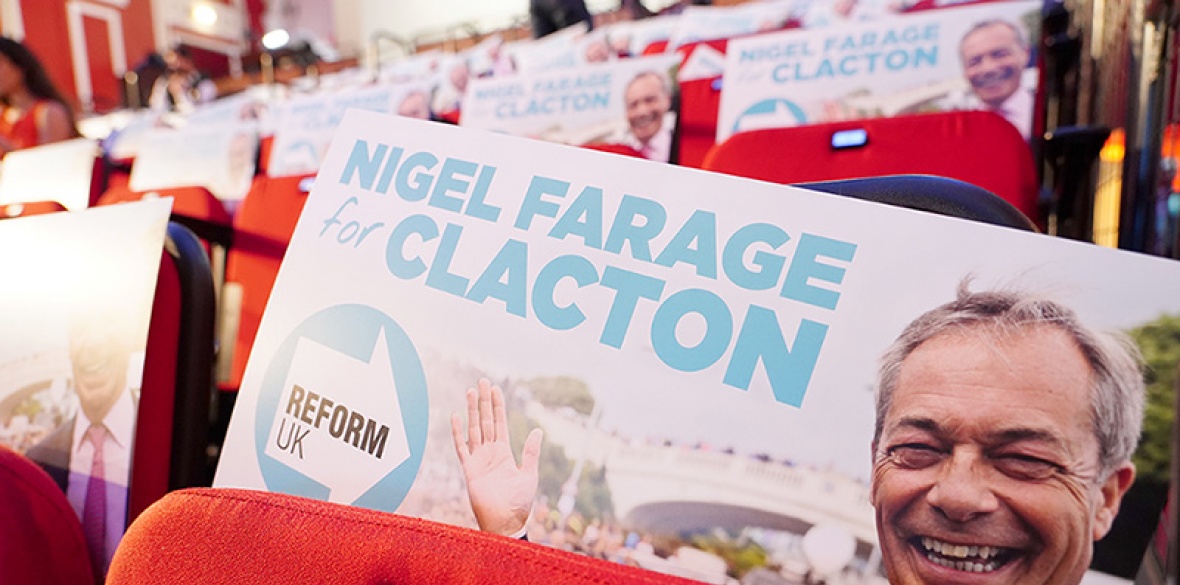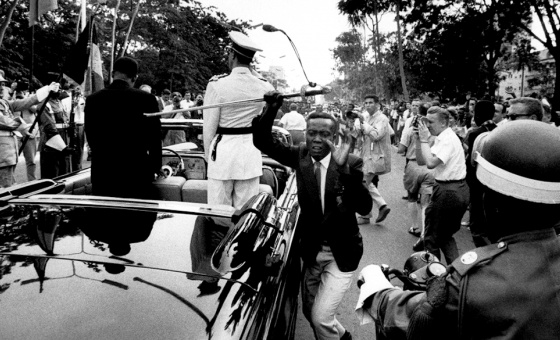This is the last article you can read this month
You can read more article this month
You can read more articles this month
Sorry your limit is up for this month
Reset on:
Please help support the Morning Star by subscribing here
DURING this general election campaign, I’ve been lucky to travel across the country — from Luton to Leeds, Blackburn to Bedlington — knocking on doors for excellent socialist Labour candidates.
But less than a week before polling day, it looks like “the only way is Clacton” — to coin a phrase — with the Essex seaside town now on the front line in the fight against the far right.
Nationally, the Tory vote continues to crater, haemorrhaging both to Reform and “abstain,” with some support shifting directly to Labour, which seems to be steadily winning over the “don’t knows” — meaning most sitting Labour MPs are likely to be re-elected amid a predicted landslide.
But the party’s response to the Gaza genocide has alienated many natural supporters, especially three key demographics — Muslims, young people and older progressives.
Obviously the demographic shapes of all 650 UK constituencies are different but some normally safe seats could see Labour voters either stay at home or switch to the Workers Party or more likely one of the wide variety of independents, from socialists including Jeremy Corbyn in Islington North to the many candidates endorsed by groups like The Muslim Vote.
Even socialist Labour MPs who have led the way standing up for Gaza, for example by breaking the whip last November to vote for an immediate ceasefire, are potentially vulnerable to smear campaigns waged on WhatsApp and social media.
And while those MPs with long strong records and deep community ties can count on effective and extensive support exposing these lies, the hostility and even hatred towards Labour over this issue has been apparent from many of my doorstep conversations.
More serious than any electoral threat is the security threat, highlighted by clashes between Labour supporters and independents in Blackburn the weekend before I visited.
Videos promoting false claims about the voting record of incumbent Kate Hollern, who is backed by Labour Friends of Palestine and has consistently supported a ceasefire, had been widely shared within WhatsApp networks, while masks were made of the MP with blood dripping into “Labour genocide” accusations.
Of the scuffles, Hollern told the Lancashire Telegraph: “My colleagues and I were abused and bullied, and people were sworn at and spat upon. I was repeatedly told to go away and that I didn’t belong there.”
This is appalling. Candidates must be free to campaign without fear of violence or intimidation, whatever their political positions — that’s central to our democracy.
Behaviour like this — from spitting in Blackburn to throwing milkshakes and rocks in Clacton — normalises and encourages physical abuse against politicians.
With two MPs assassinated in recent years, it has no place in our democratic system. The only way to defeat an electoral opponent is at the ballot box.
Counterproductively, the milkshaking played straight into Nigel Farage’s hands — so much so it was widely believed for a short time this was a false flag and the Reform leader himself was behind it.
Of course, Farage is also guilty of whipping up racial tensions and hatred, but instead looks set to be rewarded with a seat in the Commons, at least if the bookies are to be believed.
However a recent Survation poll had him neck and neck and neck with Labour and the Tories as a result of splitting the Conservative vote right down the middle.
If just half of local Lib Dems and Greens vote tactically behind Labour candidate Jovan Owusu-Nepaul, a young charismatic black man, Clacton can send a powerful message rejecting Farage’s racist and reactionary vision for Britain.
But to stand any chance of doing that, he needs the full support of his party, which he works for in its equalities team.
Bizarrely, it was reported in the Star and the Guardian that Owusu-Nepaul had been “seconded” to the West Midlands and that “the local campaign in Clacton said that it had been banned from printing leaflets, blocked from using campaigning software and had access to the campaign’s social media overridden, with posts deleted on X.”
The Guardian also quoted a letter from Owusu-Nepaul’s agent to Labour’s general secretary, which stated: “Reform UK stands for everything we the Labour party stand against … and I’m struggling to come to terms that it appears the party doesn’t even want to be seen to be putting up a fight.”
It’s possible Owusu-Nepaul, who was praised in a recent GQ interview as a future “minister for style” with his “truly banging outfits” after a cordial street encounter with Farage, is a victim of his own success.
The Guardian suggested that Labour headquarters were angry with the traction he was getting, quoting a campaign source that, “at one point [Jovan] was getting more retweets than Keir Starmer. The officials were furious with him and said he was distracting [from] Starmer’s campaign.”
But the following day, the Clacton Gazette quoted Starmer telling reporters that “we are not backing down in Clacton” and adding: “We have got an excellent candidate there, he actually works for me, he is fantastic, so I’m very supportive of him and the campaign that he is running, and he is doing something incredible in Clacton which is being that positive candidate in difficult circumstances.”
These “difficult circumstances” are why the labour movement needs to throw its full weight behind Jovan — battle bus and all — and encourage union members and others to help out on election day and beforehand if they can, both because he’d make a great MP but also to block a far-right foothold in Parliament.
Having spent days canvassing in this long-left-behind coastal community, I’m certain Jovan can win if we successfully turn out the anti-Farage vote on Thursday.
If we don’t, Farage hopes to be leading the Tories within two years and the country within five. There is still time to stop him — and the stakes couldn’t be higher.











